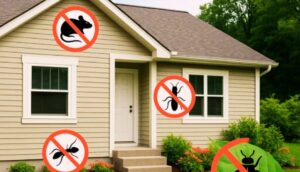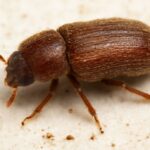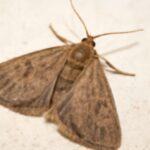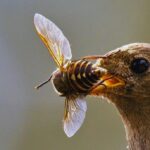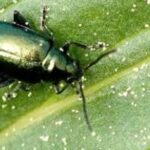Let Nature Defend Your Garden

If you grow tomatoes, peppers, or eggplants, you’ve probably met the dreaded tomato hornworm.
They’re big, green, and can strip your plants overnight.
The good news?
You don’t have to reach for chemicals right away.
Nature has its own army of hornworm predators ready to protect your plants. By encouraging these beneficial creatures, you can keep hornworms under control and keep your garden thriving.
In this guide, you’ll learn about the most effective natural predators of tomato hornworms, how to attract them, and why they’re so important for a healthy garden ecosystem.
What Are Tomato Hornworms?
Tomato hornworms are the caterpillar stage of the five-spotted hawk moth (Manduca quinquemaculata).
They get their name from the small horn-like spike at the back of their bodies. They are harmless to humans and their chewing power will cause devastation to tomato plants.
They can grow up to four inches long and blend perfectly into green foliage. That camouflage makes them tricky to spot—until you notice missing leaves.
Why Use Natural Predators?
Natural predators are a safe, chemical-free way to control hornworms.
They reduce the pest population without harming your soil, pollinators, or edible crops.
Plus, attracting predators creates a balanced ecosystem in your garden. Once in place, these beneficial insects and animals often stick around to handle future outbreaks.
The Top Natural Predators of Tomato Hornworms
Here’s the lineup of nature’s best hornworm hunters.
1. Parasitic Wasps

These tiny wasps are the tomato hornworm’s worst nightmare.
Species for example Cotesia congregata will lay their eggs inside hornworms which is the host insect pests.
As the larvae grow, they feed on the hornworm from the inside. Eventually, white cocoons appear on the hornworm’s back.
Once this happens, the hornworm stops eating and dies.
How to attract them:
-
Grow nectar plants like dill, fennel, and sweet alyssum.
-
Avoid using broad-spectrum insecticides.
2. Lady Beetles (Ladybugs)

Most gardeners know ladybugs for eating aphids.
But some species also feed on hornworm eggs.
By destroying the eggs early, ladybugs help prevent hornworms from reaching their leaf-munching stage.
How to attract them:
-
Plant pollen-rich flowers like marigolds and calendula.
-
Provide shallow water dishes with pebbles.
3. Lacewings

Green and brown lacewings are another egg-eating predator.
Their larvae are fierce hunters, nicknamed “aphid lions.”
They don’t just eat aphids—they also target hornworm eggs and small caterpillars.
How to attract them:
-
Plant cosmos, coreopsis, and dandelions.
-
Keep a diverse planting to provide shelter.
4. Birds

Songbirds, especially robins and mockingbirds, will gladly have a feast on hornworms.
Their sharp eyesight helps them find these camouflaged pests faster than you can.
How to attract them:
-
Add birdbaths and feeders.
-
Plant native shrubs for nesting spots.
5. Chickens

If you keep backyard chickens, you already have built-in pest control.
They’ll peck hornworms right off your plants.
Note: If hornworms have been feeding on tomato plants, they may taste bitter to chickens—but many still eat them.
6. Spiders

Garden spiders are patient hunters.
They’ll trap smaller hornworms in webs or ambush them on leaves.
While they may not take down a full-grown hornworm, they help reduce younger stages.
7. Predatory Bugs
Insects for example assassin bugs, minute pirate bugs, and big-eyed bugs all target hornworm eggs and tiny caterpillars.
How to attract them:
-
Avoid pesticide sprays.
-
Plant herbs like cilantro and parsley to provide food when prey is scarce.
8. Bats

Bats may not eat hornworms directly, but they feed on hawk moths—the adult stage of hornworms.
By reducing moth populations, bats prevent future egg-laying.
How to attract them:
-
Install a bat house.
-
Keep an insect-friendly yard with night-blooming plants.
9. Toads

Toads are ground hunters that snap up caterpillars, beetles, and other insects.
If hornworms drop to the soil, a toad might make a quick meal of them.
How to attract them:
-
Provide a shady, damp hiding spot.
-
Avoid chemical sprays that harm amphibians.
10. Ground Beetles

These shiny, fast-moving beetles patrol the soil.
They eat hornworm pupae in the soil, reducing next season’s outbreak.
How to Encourage Natural Predators
Building a predator-friendly garden doesn’t happen overnight. But a few changes can make a big difference:
-
Grow diverse plants: A variety of flowers and herbs ensures year-round nectar and shelter.
-
Avoid pesticides: Many sprays kill beneficial insects along with pests.
-
Provide water: Even tiny insects need moisture.
-
Add habitat: Birdhouses, bat boxes, and rock piles can welcome larger predators.
Balancing Predator Populations
While predators are essential, you don’t want them to run out of food. A small number of pests ensures they stay in the area.
This is called “threshold pest management”—keeping pests at a level where they cause little damage but still support predator life cycles.
10 FAQs About Tomato Hornworm Natural Predators
1. What is the most effective natural predator of tomato hornworms?
Parasitic wasps are the most effective. They kill hornworms before they can do major damage.
2. Will ladybugs eat adult hornworms?
No. Ladybugs target eggs and very small larvae, not full-grown hornworms.
3. How can I tell if a hornworm has been parasitized?
Look for small white cocoons on its back. These are wasp pupae.
4. Are birds safe to have around my vegetable garden?
Yes. Most birds will not harm your plants and help control many pests.
5. Do bats really help with hornworms?
Yes. They eat the moths that lay hornworm eggs.
6. Can I buy predators for my garden?
Yes. Beneficial insects like lacewings or ladybugs can be purchased online or at garden centers.
7. Will using predators get rid of hornworms instantly?
No. Natural control takes time but is sustainable and safe.
8. Can chickens eat hornworms that have white cocoons?
Some chickens avoid them because they taste different, but others will still eat them.
9. Should I remove hornworms with cocoons from my plants?
No. Leave them so the wasps can emerge and control future pests.
10. How can I attract multiple predator species at once?
Plant a mix of nectar flowers, herbs, and native plants, and avoid pesticides.
Conclusion
Tomato hornworms can be a gardener’s worst enemy, but nature offers a built-in defense system.
By encouraging natural predators, you can protect your crops without chemicals.
Planting diverse flowers, avoiding harmful sprays, and providing shelter for beneficial insects and animals will turn your garden into a balanced ecosystem.
In the end, your tomatoes will thank you—and you’ll enjoy the satisfaction of knowing your pest control is as green as your plants.



